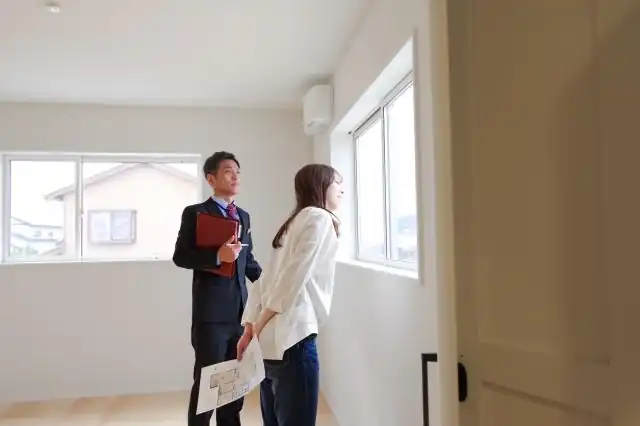The purpose of a property viewing is to determine whether an apartment you’re curious about is truly a good fit for you. While some cultures may be more open about clearly expressing likes and dislikes, there are many people who feel some level of anxiety about apartment viewings. Worrisome thoughts may include, “I wouldn’t know how to turn down a room if I didn’t like it” or, “What if the real estate agent gets upset with me for declining?”
To help you overcome such hurdles, this article will address how to politely decline a property after a viewing, how not to decline, and how to respond to your real estate agent promptly. If you want to get better at being honest with your real estate agent after visiting a less-than-ideal property, then read on!
Village House offers more than 1,000 properties throughout all 47 prefectures of Japan. If you’re looking for a comfortable room with reasonable rent prices, we invite you to explore our website!
Do I have to sign a lease agreement once I go on a property viewing?

Rest assured, if you view a rental property and it’s not quite what you had hoped for, you do not have to sign a lease or rental agreement. As mentioned earlier, people go on apartment viewings so that they can properly judge whether the room is something they want to commit to without regret. It is quite common for people to decline a room after visiting it, so there is no need for you to feel guilty about moving on to the next potential rental.
If you do turn down a place, pay attention to the real estate agent’s reaction, as it may reveal their trustworthiness. For example, it would be best to steer clear of real estate companies or agents who try to rush you into a decision or force you into signing a lease.
On the other hand, if the real estate agent provides detailed information about a property and respects your decision to decline a room, it’s safe to say that you can trust them as you continue your quest for the perfect place. Keep in mind, however, that priority is often given to early applicants, so it’s a good idea to submit your application as soon as possible if you are seriously interested in a property you viewed.
A cancellation of your application is still possible if you have not signed the lease.

Even if you submit a rental application after viewing a property, you can still cancel as long as you have not yet signed the lease agreement. While an application is an expression of your intent to enter into a contract for a specific property, and should not be taken lightly, it is not legally binding in the way a signed contract would be. This means that you still have the option to cancel even after your application is approved, provided that you have not yet signed the actual lease agreement.
That said, real estate agents typically regard an application as a prerequisite for entering a lease agreement. It’s important to keep in mind, therefore, that repeated cancellations may damage your credibility as a prospective tenant and could negatively impact future application screenings. To avoid this, please give careful consideration before submitting any rental applications.
If you can’t decide between multiple properties, compare them and sleep on it!

If you find yourself torn between options after visiting multiple favorable properties, don’t hesitate to take your time comparing them and weighing your options. After all, it’s not uncommon to regret a decision that was made in haste. However, don’t forget that a property may get taken by someone else if you deliberate for too long, so aim to decide within one or two days.
Things to keep in mind when comparing rental properties
When trying to choose between rental properties, it’s natural for priorities to vary from person to person. To help you decide, we recommend considering the following factors that often have a major impact on quality of living: each property’s location, room size, and neighborhood or surrounding environment. For example, you will likely want to compare each property’s proximity to the nearest train station as well as any convenient shopping areas. It would also be a good idea to see whether the neighborhood feels comfortable and aligns with your lifestyle.
If you still can’t decide, try comparing the total annual rent and initial costs and choose the most financially favorable option. For instance, if you want to save on initial costs, opt for a rental that doesn’t require a security deposit or key money. If you are more interested in reducing your monthly expenditure, then go with the property that has the lowest rent.
If you want to decline, tell your agent sooner rather than later.

If you decide to turn down the property you viewed, tell the real estate agent as soon as possible. The agent will continue to contact you until you give them your decision, so it would be wise to respect each other’s time and effort and inform them quickly once you have an answer.
As for the timing of your response, you can tell your agent immediately after the property viewing if you know that the rental space is wrong for you. If you need extra time to consider your options, we recommend that you reach a decision and then contact your agent within one or two days, as mentioned earlier.
How to politely decline a property after viewing it.

Be honest about your reasons for declining.
If a real estate agent conducts a viewing for you and you decide to turn down that property, be honest about what you didn’t like and let them know. For example:
- The rent isn’t commensurate with the quality of the interior, fixtures, or amenities.
- The closest train station isn’t easily accessible from the property.
- The space is smaller than you imagined.
- The available storage space isn’t practical.
- Cell or Wi-Fi reception is unstable within the room.
Honesty is indeed the best policy – if you are clear about your reasons for passing on a room, the agent will have a better understanding of your decision and will respect it. Otherwise, if you are unable to give precise reasons or come across as indecisive, the agent may try to persuade you, and that could make it harder for you to say no.
Use email if you don’t feel comfortable declining in person.
If it’s difficult for you to say no face-to-face or over the phone, we recommend communicating via email. Be sure that your email is concise, briefly explaining what you didn’t like about the property, or that you have found a room elsewhere.
If you would like to continue searching for your ideal space with that agent, you can facilitate the process by outlining the negative aspects of the room you viewed and further describing the specifications you are looking for.
Remember to express your appreciation.
If you decide against a property, you can politely let the agent know while still leaving a positive impression by thanking them for their time and effort. It’s common for properties to be declined in the real estate industry, but no one wants to feel like their energy was wasted. Take a moment to express your gratitude and acknowledge the agent’s hard work, so that the experience can be positive for both parties regardless of the outcome.
Also, remember that just because you didn’t have luck with a real estate agent or company for this search, it doesn’t mean you won’t cross paths in the future. By practicing common courtesy, you will be laying the foundation for potential future relationships, which will prove valuable if you end up relying on them again for subsequent searches.
How not to say no to a real estate agent!

Don’t ignore phone calls or emails.
Even if you find it difficult or awkward to decline a rental after viewing it, do not ignore phone calls or emails from the real estate agent in hopes that they will give up on you and move on. If you suddenly become unreachable, the agent will not know how to help you or what steps to take next.
You may not be able to answer their phone calls depending on the timing, but make sure to return the call at your earliest convenience. Similarly, it would be best to reply to their emails as soon as possible. If you plan on continuing your property search with them or elsewhere, don’t ignore any communications, and be honest about your decisions.
Don’t lie.
While it’s not necessary to provide overly detailed reasons when turning down a rental space, it’s best to avoid lying or making up arbitrary excuses. Genuine reasons such as “My company decided to transfer me elsewhere ” or “I’ve decided not to move” are perfectly acceptable. However, mishandling a situation by not being honest may lead to complications down the road. For instance, if you later discover that the same real estate agency has a listing for your ideal room, it may be difficult to approach them again.
To reiterate, be sure to be truthful when searching for a rental and declining less than satisfactory rooms because you may interact with that particular real estate agency again in the future. This will establish trustworthiness as a potential tenant and keep the door open for any inquiries you may have.
Don’t give ambiguous answers or put off responding.
It’s not advisable to be vague in your response or to avoid answering entirely. If you postpone declining a room because you find the process uncomfortable, the real estate agent may believe they have a chance to persuade or negotiate with you and will continue to contact you. If you have a proper reason, such as “I found a good room through another real estate agency,” it’s important to decline as soon as possible to avoid inconveniences for both parties.
Avoid retroactive reasoning: don’t introduce new search criteria to decline.
It is considered poor manners to decline a property after viewing it by citing preferences that were not mentioned during the initial search process. For example, you don’t want to turn down a room by suddenly stating for the first time that you wanted to live near a park, especially if this isn’t true. When looking for a rental, it’s essential to carefully consider your priorities. By clarifying your search criteria, the real estate agent will be able to work with you more efficiently.
If you are feeling indecisive about certain search conditions, we recommend discussing them with the agent rather than worrying about them on your own. Through a collaborative conversation with a professional, you will be on your way to finding the most appropriate property!
Village House offers over 1,000 rental properties throughout Japan. If you have any uncertainties regarding your search criteria or personal preferences, please don’t hesitate to contact our staff. We are here to assist you in finding the perfect rental space!
Related articles:
- Apartment Viewing for People Living Alone: What You Need to Check and How to Be Ideally Prepared!
- What to Expect from an Apartment Tour in Japan and Tips on How to Make It a Success
- Which Rental Properties Should You Avoid? Watch Out For These 5 Things!
- Top 5 Questions Your Real Estate Agent Will Ask You When Searching For A Rental Apartment
- Guide to the Apartment Lease Signing Process

Hello, I’m Machiko Doi, a freelance writer who writes about housing and living in Japan.
I live in an 80-year-old house that I inherited from my grandparents along with my two shelter cats and daughter.
We live a relaxed life while repairing the house.
I like to cook vegetables from the garden and fresh fish caught by my father, and enjoy them with cold beer on a hot day or hot sake on a cold day.



